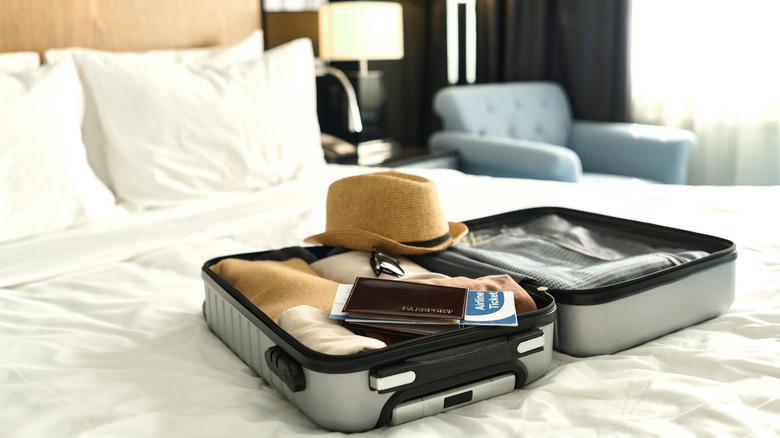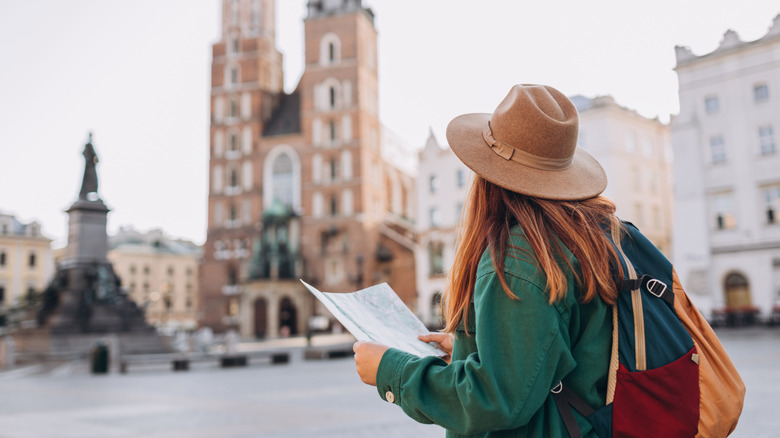Rick Steves' Simple Baggage Rule To Pack Light For Your Europe Trip
Rick Steves is an expert on European travel who has been sharing his insights with American travelers for decades. As well as delivering top tips on making the best of visits to European ruins and what to do when staying with European locals, Steves is adamant that there is a set limit to what you should be taking with you when you head off on your adventure, no matter how long you expect to be on the road. According to him, the most you should pack with you when traveling adds up to a total of two cases: one suitcase — large, if necessary — and one day bag. That's it, nothing more. That said, Steves' attitude to the practice of stuffing the pockets of your coat with as many books, devices, and knicknacks that you were unable to fit into your case is not touched upon.
In his blog, Steves writes that you should pack just those two pieces of luggage and then be comfortable with the fact that, from the moment you leave, they are "your world, whether you're going for two weeks or two months, in summer or in winter, on a bus tour or cruise, or on your own." He also claims that a single suitcase and a day bag is enough luggage for anybody, and argues that packing light in general comes with a number of added benefits for travelers — especially in Europe.
Rick Steves' essentials when packing light
One of the top tips we've learned from Rick Steves over the years, the expert has a pretty concise list of the essentials you need to pack for a trip to Europe. This includes things like practical shoes for use in European cities where walking comes with the territory, and the ground may be uneven. Even better, if you decide to wear your walking shoes to fly, you can possibly forgo packing a second pair. Along with this, he also recommends limiting your wardrobe. Instead of packing fresh underwear and socks for each day of your trip, plan to do laundry at opportune times and repeat your outfits. Similarly, Steves recommends that you avoid packing duplicates, like a second jacket, and cut your toiletries down to the absolute essentials — you can always buy more if strictly necessary.
However, there is one thing Steves says not to cut back on: electronics. After all, the travel pro believes that these can be valuable when researching where to go and what to do. Along with that, he suggests that you extract the information you need from guidebooks instead of carrying them around as deadweight on your actual trip. Beyond that, the travel pro argues that you should always make room for little luxuries — such as noise canceling headphones — that can make the ordeal of traveling a lot more enjoyable and less stressful.
More benefits of packing light for a trip
Packing light is a travel maxim for a reason — especially when you're traveling in and around Europe. When in transit, it means that you are more maneuverable, and it is much easier to stow one or two bags than it is to find room for more. Plus, this also reduces the chances of accidentally leaving something behind. "At airports, if you don't have your bag on hand, you can't jump on the next available flight if yours gets delayed," Rick Steves notes.
A major benefit of traveling light, Steves writes, is that dragging large cases around European cities will instantly make you stand out as a typical tourist — which, depending on where you are, could make you a target for scammers and thieves. At the end of the day, it is difficult to keep an eye on multiple pieces of luggage when you also need to have your eye on train station display boards, or the end of the street in search of the next bus or cab. Instead, traveling as light as possible will make you more dynamic in terms of where you can go.
As a final tip, Steves recommends, if possible, that you always pack a comfortable backpack instead of cases on wheels, which can be impeded by narrow, steep, and cobbled European streets. Better yet, if you have packed light enough, you won't feel the need to immediately check your luggage into your hotel wherever you go, meaning that you get to see more of the sights. And, at the end of the day, isn't that what European travel is all about?


